A few words with Brett Sutton
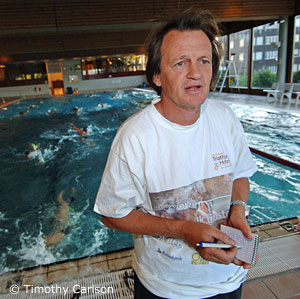
Quite a few changes are in the works for Team TBB in 2011 and coach Brett Sutton spent time with slowtwitch to discuss the new initiative, his coaching ideas and various other topics in triathlon.
Slowtwitch: We appreciate your time Brett.
Brett: That's no problem, I am very happy to answer any questions and thank you for the opportunity.
ST: For a couple years now Team TBB had quite a selection of Pros on the roster, but for 2011 that Pro roster seems to be smaller. Do we see this correct?
Brett: 2011 is indeed going to be our most bold initiative since starting the team. Alex and I, just could not get past the possibility of just running a small Pro team of athletes, that can now sustain themselves of the back of their performances that they have generated while benefitting from our development strategy. So we have discussed at length with our 2011 sponsors, and all I am proud to say all have shown vision to see that triathlon at this time needs to support development athletes as well the champion athletes. Thus, and we will announce here first,
Team TBB will be splitting in 2011. It will comprise of 3 smaller teams that will represent the areas where most of the athletes were born and outside of training camps reside and race. We are looking at a USA based team, a European based team and an Asian / Pacific team. The teams will carry headline stars but also retain 2 spots in each team for development athletes. We are at presenting developing bases in each of the 3 centers over the next 2 years, so not only the Pros can train there but also age groupers can access the coaching facilities.
ST: Wow, those are indeed quite a few changes.
Brett: Yes, all in triathlon have been subjected to the reality of the economic meltdown being felt through the whole of the world community. It was our number 1 priority to make sure the team was able not only to be sustainable, but also to continue what our starting mission was. That was not to have the best team, but to create a path for athletes who were trying to cope with work while training to reach their full potential could put 1 or 2 years of full time training in. That option has been our main discussion, in reviewing how we take the team forward.
ST: So who stays and who has left?
Brett: On the team TBB website we have mentioned the members who are moving on or are retiring. We are going to be finalizing the new roster for the teams over the next 2 weeks. However for your fans, James Cunnama, Caroline Steffen, Amy and Brandon Marsh, Bek Keat, Tereza Macel, Hiro and Maki Nishiuchi from Japan, Scott DeFilippis and the Wongstar will all be staying next year. They will be joined by current World 70.3 Champion Jodie Swallow, who trained and trialed with team TBB last season, Felicity Abrams from Australia, and from the USA Mary Beth Ellis, all ladies who will need no introduction. They are top class athletes, who just need to reboot their careers. On the men's side we have added Aaron Farlow from Australia, who made his long course debut last year, also David Dellow from Australia and Daniel Halksworth from the Island of Jersey. All three were long term competitors in the ITU, and in my opinion are better suited to long course racing and so this year sees them start their journey to see if they can shake up a few of the established stars in Ironman racing. We have a goal for the boys to work hard this year learn what its all about and really be competitive in 2012. It is my hope they follow the James Cunnama path.
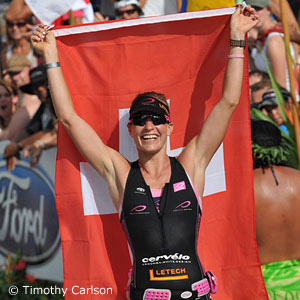
ST: The Pro qualification for Kona has changed for the 2011 season. What are your thoughts on the new rules?
Brett: The qualification changes will and already has had an impact on the racing at the back end and for the starting races in 2011. With athletes who don't like doing Ironman races close to or in the same season as Hawaii, clamoring to raise their points level, so they are free to plan their training for the last 4 months leading into Hawaii. It won't affect team TBB, as we are not frightened of racing in that period to qualify.
My opinion? Well, let's say it is misguided at best to see races that have been on the calendar for 25 years, fantastically successful in WTC terms with large age grouper turn outs, to be gutted of prize money and points is a real shame and backward step. However I am positive that WTC will change for the better once the new owners realize that the value of their brand is enhanced by a great Pro circuit with a strong base of paid athletes. That is what our changes are about; we will not succumb to abandoning the struggling pro. I am not one that thinks this is a niche sport, but could compete at the highest levels both in popularity and money, but it takes the will to develop it.
ST: With Caroline Steffen, one of your athletes is currently sitting on top of the rankings. Will we see her there by mid-summer?
Brett: Xena to us and Caroline Steffen to the general public is not a flash in the pan athlete. Just as Chrissie, she is the real deal. But our season will not be bullied in the mad chase for points come end of June. Xena will be taking on all comers and will finish the season up in the top 3 again. We look to 2011 to consolidate her remarkable results of 2010 and we will see further improvement.
ST: Chrissie Wellington was part of your team and has now moved one to do her own thing of sorts. Has she shown us all her potential yet?
Brett: Chrissie has done wonderfully well and we moved on without any remorse. We are still in contact and I hope will continue to be when her tri career is over. My job now is to train people to win Hawaii not to beat Chrissie. If she happens to be the champ then, we look to develop athlete skills to beat the champ. Pretty simple – that is the essence of sport and we both understand and respect that. Chrissie I feel has now fallen under the spell of what I protected her from initially, and thus we also agree to disagree, on how she now races. There has never been a better women's Ironman competitor than Chrissie Wellington, the first champ that has no weakness in any of the 3 disciplines. I am proud of my small part in that.
ST: Explain to us what you mean with the spell Chrissie has fallen under.
Brett: One of Chrissie’s greatest advantages and what allowed her improvement to be so dramatic was that she knew nothing about Ironman triathlon, was not involved in the lifestyle and was not hindered by those that had come before. I had a blank canvas, I painted the numbers up and we agreed they were gettable. She didn’t have any sports science or medical affiliations and thus her career success is based on that.
This sport is the ultimate tough test, each race hurts your body so much at the top level. To drive it to the edge of oblivion when you have a 20-minute lead is complete negligence. It has cost her dearly last season, but there we were busting it again for the triathlon fraternity by the end of the season. If there was a $100,000 prize for breaking the records, then it is different.
So I’m afraid Ironman is not a 200m freestyle swim event, it is a body shattering 9 hours. We have always treated it with respect. When you have the win you shut it down and work on recovery for the next battle. We both agree to disagree and that is what I most like about Chrissie. We could discuss everything and no recriminations after, its one of her many strengths.
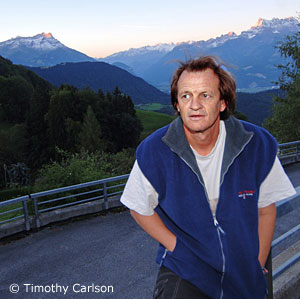
ST: When did you find out she wasn't starting in Kona and did that impact your strategy for the team?
Brett: Chrissie's withdrawal didn't impact how my team went about its business. I think Ironman is personal; we try to get the best out of ourselves, and then measure it at the end against the other people. Andreas Raelert learned that the hard way this year. You play the man instead of the ball, and you can beat yourself.
ST: How did Andreas Raelert play the man instead of the ball in your view?
Brett: It is a simple race strategy equation and at the moment (Kona 2010) he made the wrong choice. It is easy sitting from the sidelines to say that, but Macca has 20 years of form to be viewed, so the decision to sit in and try and recuperate was always going to be very, very dangerous. Anybody who knows Macca let out a sigh of relief when Andreas didn’t slide up to Macca and then attack and blow straight past that was his chance to take the Holy Grail. You don’t take Macca out in the last 1 km unless you got an elephant gun. The business has to be done way before that when dealing with Macca.
ST: You are considered to be quite tough on your athletes. Is that a fair statement?
Brett: Well there is a lot of confusion about that – I am not tough on anybody training wise. Because athletes who ask to come here want to improve, they crave to work hard. I spend most of my time slowing people down, Chrissie being a point of note. Our fights or debates were never about training – in fact she is the easiest person I ever had to train. Once she knew the rules about winning, that girl just morphed into the total 100% best professional. James Cunnama does less now than his first 5 yrs in the wilderness. It depends on the athlete, I wont deny Hillary Biscay ran 65 km on a training run but then again, I saw her in 3 years get her dream. I saw her win an Ironman, I saw her get on a great deal of podiums and I saw her beat some great athletes whose talent dwarfed hers. It is about the individual and their needs. So no I don't think I am hard, in fact some tell me I am a soft cuddly bear.
ST: Which other coaches in triathlon does this soft cuddly bear respect and why?
Brett: John Hellemans, Darren Smith, Ben Bright, Siri Lindley, Jackie Gallagher, Craig Walton, Rob Pickard. These are coaches outside of our team TBB coaching staff, as I think that was your question was alluding to. I also respect Chris Jones from England.
ST: Yes, we wanted to indeed know your thoughts about coaches outside the Team TBB circle. Most of the ones you mentioned have been around for a while, but what about the newer generation of coaches?
Brett: In most sports there is an apprenticeship for coaching. In swimming you can be the worlds best swimmer and unless you buy your own program, most of the top programs in the world will hand you the kick boards and send you to the paddle pool and give you a bunch of 7-year olds and say 'ok here is where you start to learn about coaching,’ and you move your way up, with experience. Most well established sports are like this. Roger Clemens might be given the assistant to the pitching coach role in his franchise should he want to coach, but nobody in their right mind would hand him the manager job of the Yankees straight up.
We have 3 types in triathlon – athletes coaching so they can race around the world, as they are not good enough to earn their way through performance. We have former athletes that either cant leave the life style or were champion triathletes, and we have the sport science grads who are looking for a job and find triathlon has the least coaching history and thus embraces the new found knowledge must be the secret to success.
Do I knock any? Here is where I get misunderstood. No, a big no, you got to start somewhere, but do I call them head coaches? Sorry, not my style.
So to answer your question, I don’t see many. The sport has too many calling themselves coaches, and not enough of the real deal.
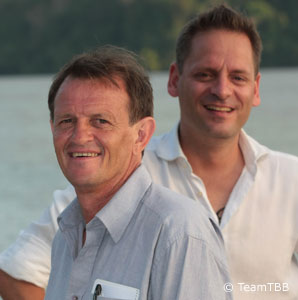
ST: How does your new Elite Development Coaching vary from the other Team TBB coaching offerings?
Brett: The Elite Development arm was formed by the overwhelming response we have had for places in our development part of the team. Herbert, that is my hardest job, saying sorry to so many people. So for 2011 team TBB will provide a pathway for those people we used to have to turn away. We will provide expertise as given to the teams that train under our system.
It differs from the age group online program in that all major directions and decisions will be referred to and in consultation with liaison coach and athlete to me and I will make those final judgments.
ST: How big of a group of Elites do you expect to deal with under that program?
Brett: We will cap the number at 20 minimum and a maximum of 30. This way the individuality will be preserved. We will have a liaison coach for each 10 athletes who will be working to our system right down to the type of sets given. It is our hope that from there we provide a path way or stepping stone in the future to select our team members from this pool and those that can get selected to other teams will be good enough to do so.
ST: Who will win Kona and Las Vegas in 2011?
Brett: Herbert, I don't make this sort of predictions. I do know what it is going to take and I am instructing those that train with me to look to develop the skills to reach those numbers. As we seen this year, nothing is a certainty – that is the beauty of Ironman. The planning is so crucial, and then the execution on race day takes a special person. You only have to look through the Ironman honors role to see that no one flukes this race.
ST: Is there anything else we should know?
Brett: Well, the main thing is I believe that the sport belongs in the top echelons of sport. I don't believe for a second it hasn't got there because of the way the sport is. I think it is the premier endurance sport; it mimics our life – 8 hrs of hard toil in a day. This is a sport where for 8 or 9 hours you can go full bore. Who can produce the best performance over a good mix of sports for a working day? I think every working person can relate to that. We just need to explain that and advertise it better, and the masses will get interested.



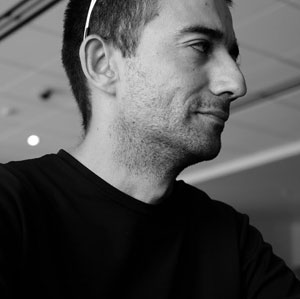
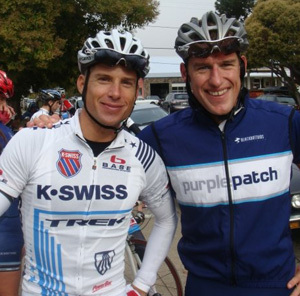

Start the discussion at forum.slowtwitch.com